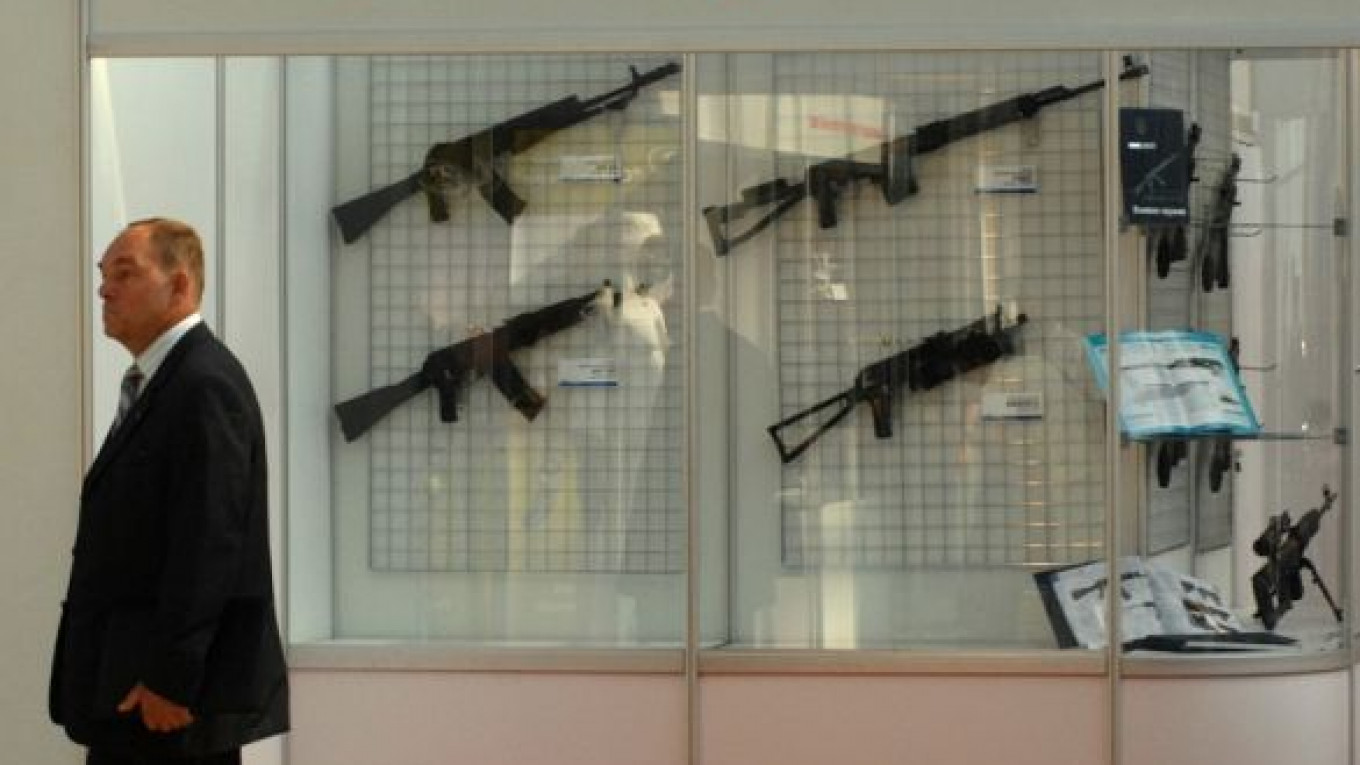The producer of the legendary Kalashnikov rifles, Izhmash, is betting on an increase in exports of nonmilitary weapons, which skyrocketed in the January-to-September period, besting output over the same period a year earlier by 60 percent, the company said Thursday.
Exports of civilian weapons totaled 484 million rubles ($15 million) during the first nine months of the year, and the overall figure for 2012 is expected to reach 665 million rubles, Izhmash said in a statement.
Since carrying weapons in Russia is severely restricted by law, the United States remains the major consumer of nonmilitary arms produced at the plant, Alexander Kosov, acting chief executive of Izhmash, told reporters. He added that Izhmash supplies weapons for retail sale as well as for use by the country's police.
The United States accounts for more than 80 percent of the plant's export sales. Other big markets where the plant sells civilian weapons are Kazakhstan, Ukraine, Pakistan and Norway.
Kosov said negotiations on next year's contracts are under way, with exports expected to grow approximately 20 percent from 2012, according to preliminary estimates.
Once a defense industry giant, Izhmash is now focused on making civilian weapons, whose share of total output is between 60 and 70 percent.
"We think this trend will continue next year," Kosov said.
The company plans to make 150,000 guns next year. Total production from January to September was valued at 2.74 billion rubles, up from 2.64 billion rubles during the first nine months of last year, Kosov said, adding that the growth resulted from expansion of the company's market share abroad.
He said the plant's situation had drastically improved after parent company Russian Technologies began financially restructuring the subsidiary.
The announcement came amid a curious campaign against the current management of Izhmash that some said was orchestrated by regional authorities of the Udmurtia republic, where the plant is based.
In one recent move, a group of the plant's veterans, supposedly including legendary rifle designer Mikhail Kalashnikov, reportedly sent a letter to President Vladimir Putin asking him to save the 200-year-old factory.
It is facing an array of problems, including a decline in manufacturing and failure to meet procurement deadlines because of inefficient management. Sources said later that the veterans' signatures had been faked.
The letter echoed earlier accusations by Udmurtia's government. Regional Deputy Prime Minister Ildar Bikbulatov said in October that Izhmash had "basically failed to fulfill all its defense orders."
Kosov said that he hadn't seen the veterans' letter and that no one had seen Kalashnikov signing it. He also rejected accusations that the company was not satisfying defense orders.
Izhmash has already supplied most of the weapons ordered by the state for this year, Kosov said. Although the plant required additional time to improve the quality of the weapons, it will fill the gun orders by the end of this year, he said.
The Defense Ministry suspended purchases of Kalashnikov rifles last year, saying that warehouse reserves of the gun significantly exceed needs. The ministry also demanded that Izhmash provide a modernized version of the assault rifle.
To meet those requirements, Izhmash has proposed to upgrade the guns in reserves and is developing a new AK-12 rifle, which could be supplied to the armed forces, Kosov said, adding that
official testing of the AK-12 might start next year.
Earlier this month, Russian Technologies postponed a contest to appoint the plant's chief executive. It was initially scheduled for Nov. 12. The state corporation will accept applications from candidates until Dec. 19, according to a statement posted on its website.
The date of selection has yet to be set, but Kosov said there's no doubt that the contest will take place.
"There's no other mechanism to appoint a director," he said.
Related articles:
A Message from The Moscow Times:
Dear readers,
We are facing unprecedented challenges. Russia's Prosecutor General's Office has designated The Moscow Times as an "undesirable" organization, criminalizing our work and putting our staff at risk of prosecution. This follows our earlier unjust labeling as a "foreign agent."
These actions are direct attempts to silence independent journalism in Russia. The authorities claim our work "discredits the decisions of the Russian leadership." We see things differently: we strive to provide accurate, unbiased reporting on Russia.
We, the journalists of The Moscow Times, refuse to be silenced. But to continue our work, we need your help.
Your support, no matter how small, makes a world of difference. If you can, please support us monthly starting from just $2. It's quick to set up, and every contribution makes a significant impact.
By supporting The Moscow Times, you're defending open, independent journalism in the face of repression. Thank you for standing with us.
Remind me later.






